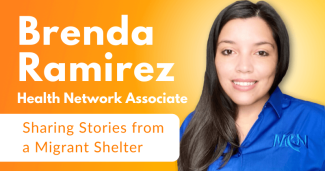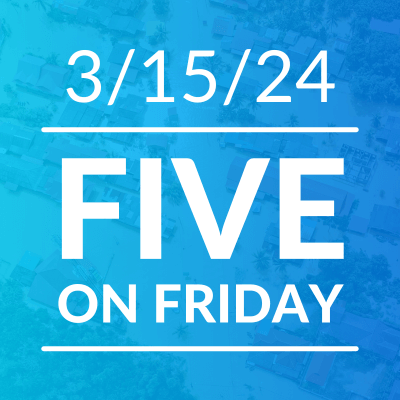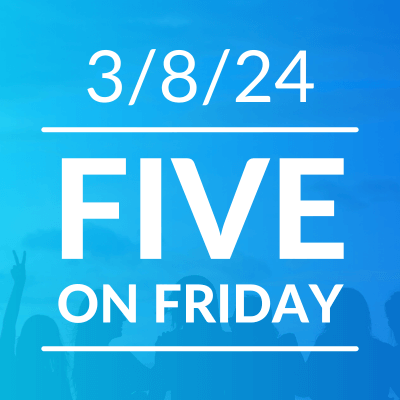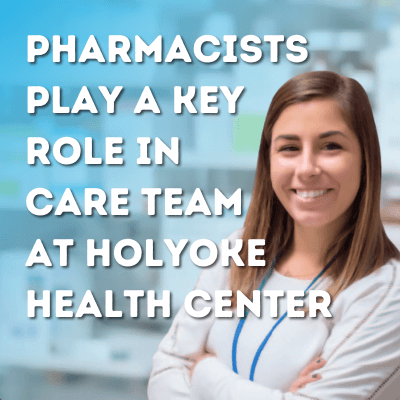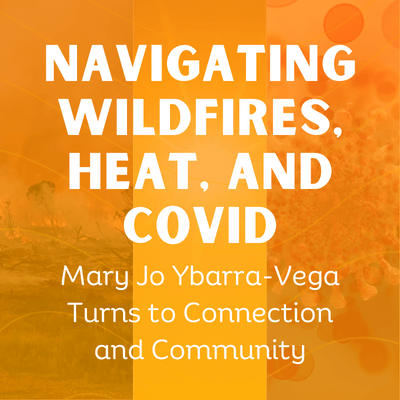Health Network Associate Brenda Ramirez: Sharing Stories from a Migrant Shelter
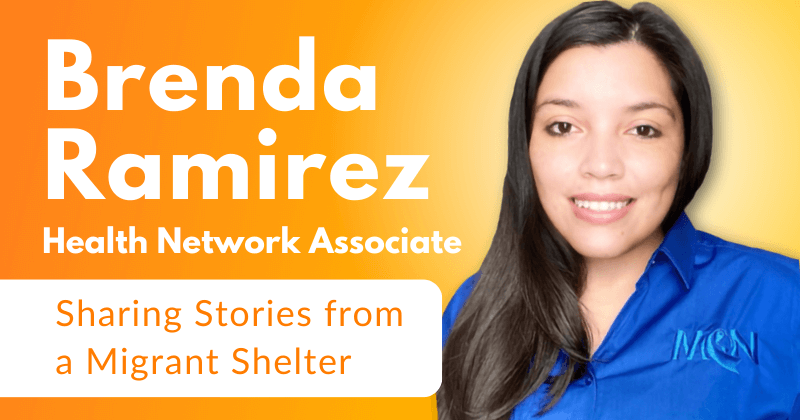
[Editor’s Note: Our Health Network Associates save lives, every week. They provide critical, hands-on case management for migrants and asylum seekers with ongoing health needs that may otherwise be unable to access care during and after their migration. Read other Associates’ stories: Enedelia, Saul, Alma, Robert, Norma, Nestor, and Joshi]
Brenda is a diligent individual who truly enjoys her work. She consistently strives to give her best effort and is both nurturing and dependable. Brenda has been a valuable resource, helping me to comprehend all aspects of my role here at MCN. I am delighted to be a member of her team.
- Enedelia Basurto, Health Network Associate
Brenda is awesome! Not only is her work ethic amazing, but her whole personality -- she really is a woman of many talents... It's important that patients are received with kindness, and she provides that kindness and safe space for them.
- Elizabeth Gonzalez-Ibarra, Health Network Associate
Brenda Ramirez, Field Health Network Associate, joined MCN in 2020. She is one of the few Health Network Associates who works in person, collaborating with medical teams at immigrant shelters at the US-Mexico border. She primarily works with pregnant asylum seekers, enrolling them into Health Network and sharing with them what they can expect from the program. While they travel to their new destination, Ramirez begins virtual case management, finding patients medical homes for their prenatal care in their new towns. She also assists patients in navigating other aspects of their care, like signing up for sliding scale fees and finding other local resources like food banks. In this interview, edited for brevity and clarity, Ramirez shares more about her work, her patients, her upbringing, and her family.
Tell us about the case management that you do.
All of the Health Network Associates do case management. Once [patients] get to their destination, we ask for their address, we start looking for clinics in their areas. We start calling the clinic, setting up appointments, and then setting up transportation. Sometimes, if they need to get referred to a different clinic, then we also do that.

Pregnant women arriving at the migrant shelter.
With the amount of time you spend in the field, how much time are you able to commit to case management? How many cases do you typically manage at any one time?
Since it has been a little bit slow here at the [immigration shelter], and this is the main place where we enroll our patients from, right now, on average I think I have between 40 and 50. I’m three days out of the week, usually between four to six hours a day, and then the rest of the time I'm doing the case management at home.
And I mean, even though we all have the same title of Health Network Associate, we all of course have different stuff that we do.
Where did you go to school?
Here at my local university, it's called the University of Texas Rio Grande Valley.
What did you study there?
Psychology.
You mentioned that you're from the Rio Grande Valley where you went to school. Did you grow up there?
Yes. Well, I was actually born right across the border in Reynosa. It’s maybe 15 minutes from here. Since I was maybe two, I've been here in the same area.
Did you grow up primarily speaking Spanish or were you able to learn English when you were young as well?
Spanish is my first language. But I was maybe five or six when I learned English, but because my stepdad, he spoke mostly English and I was a hardcore bookworm so that really helped me.
Right now, Ene and I have been trying to at least understand Haitian Creole for at least a year. And no, it's not sticking.
I was told that a lot of people that come from Haiti are often in Mexico for a little while first and pick up a little bit of Spanish, but I would assume that it's always better to have dominant languages in common.
We always have the translation services here through our phone, but there are some people that speak Spanish fluently. They’ve been in South America and Mexico for so long, and they learn it really well.
Sometimes they prefer for us to speak Spanish, I guess, because they want to continue practicing it. The little kids, usually when they are younger than 10, they all speak perfect Spanish.
I wanted to ask about some of the cases you've worked over the years. Are there any that made you feel like you were proud to be a part of Health Network?
Yeah, I honestly feel like I have so many. Because I get to see them in person, I feel like it's easier to have a connection with somebody when you're in person. But it's funny because I had this lady with her husband, a little girl, and her newborn. She ended up having the baby literally as soon as she crossed into the US. The middle of nowhere in the US.
They didn't cut the umbilical cord because obviously they didn't know how to, so they waited there for a few hours until Border Patrol found them. And that’s always a really, really, really tricky thing, because Border Patrol can say “no, what if the baby was born in Mexico?” But this was such a good agent. He called them an ambulance, but before that, and I know this because I read the report, he wrote a report putting down the exact coordinates where he found them and the newborn. That way they can't try to say that the baby was born elsewhere.
She was actually here [at the immigration shelter] for a few weeks until they were able to certify the paperwork that the Border Patrol agent wrote. And so I got to bond with them every time I would come. They would tell me their story and it was so funny because their little girl was always so excited to see me. The baby was little, so he didn't care. But the little girl was so funny. She would tell me random jokes. It felt nice, you know? Then, finally, when they got the report, they were able to get the baby's birth certificate and they were able to travel.
After that I helped them get into care -- the baby, the little girl, and the mom. And I told the husband, he was healthy, but if he ever needed anything, this clinic is like a family clinic.
But anyway, I'm not a mom, I've never had kids. I got her into care, then they didn't need [any more of] my help, so I closed the case. I didn’t want to close it. But literally every year on Mother’s Day, the mom sends me a message saying “Hi, Brenda! Happy Mother’s Day!” And I’m the type of person where I’m not going to say, “wait, I'm not a mom,” or correct them, so I'm always like, “Thank you! Hope you have a good one too.”
I was just thinking about her the other day when Mother's Day was coming up. And mind you, it's been already like two or three years since I met her, and sure enough, she sent me a message.
And I told her, “Oh my God, I was just thinking of you.” And she said, “you know what? We never stopped thinking about you either,” and I was like, oh, my God, I'm going to cry.
She told me that they ended up having another baby and she told me that since they already knew the clinic and the process, they were able to do it themselves.
There’s a lot of people that I remember, and sometimes I wonder what happened to them. But I feel like that's one of the cases that I always think about, especially the little girl and her funny little jokes.
That’s an amazing story. I also would like to see if there's any more recent ones that kind of stick with you?
Just recently there were two really young girls, 19 and 20. They were both from South America. They've been here at the shelter for almost 15 days. And mind you -- this is a respite center, so it's typically like 24 hours. You come in, you get care, you get out. That's it. So, the shelter actually let them stay here because their husbands were detained. And honestly, it was very difficult to know if they were going to let them go, or if they were going to get deported. So, you can imagine, one of them was an emotional mess. She would cry every day. The other girl, she was always smiling, laughing, and she would say, “well, I can't be sad because she's already sad.” She thought she had to be the strong one.
They’re so young and I can't even imagine having to go through all that. And they did tell us that they went through Central America and had to go through the Darien gap. They said that they experienced a lot of people getting killed. Men, women, kids, whatever. Getting killed, getting raped, getting put in cages. They got robbed too, and when they got here, they got separated. They're pregnant. They're really young and their only support is their husbands.
Their anchor contacts, who we would normally send someone to from the shelter to stay with, said, “we don't know you, we know your husbands.” So, the anchors ended up not wanting to take either of them in, so that's why they were here for so long. They moved to a different shelter and from there somebody was kind enough to take them into their home.
I ended up asking Dr. [Marsha] Griffin, [MCN Clinical Consultant] for help to see if we could find a clinic here in the area for them. She works for the university, and they have a lot of programs since recently they opened the School of Medicine. She was able to help me connect with the clinic that was going to be able to help them. Just yesterday [at the time of the interview] they had their first appointment. Thankfully, we have the Uber services right now – Uber is providing rides for Health Network patients to get to their appointments. We were able to set up their Uber service and so it took them to their appointment and brought them back, and their husbands got released, so they asked if their husbands could go with them! So, they all went together, and they were very happy, obviously, that their husbands got released and also that they were able to go to their first prenatal appointment with their husbands. That story, you know, is still developing because they're pregnant.
Was that your first time using Uber for your patients?
Yeah, it was. I had no idea how to use it, so I had to ask Elizabeth, another Health Network Associate.
I was able to do a round trip because obviously they didn't have anybody to take them home. I set up one for both of them because the clinic gave them the appointments really close to each other just so that they could come together. So, they ended up both going together and with their husbands, and then they were able to get back home.
And when they went back home, they didn't even have to ask me how to do it. I saw on the program that it said the Uber was requested to take them back home. I mean, they're young, so obviously they know more about all this stuff. But I was relieved that they're doing good on their own.
With the Uber system, when you say that they requested to get back home, does that mean that the patient using the Uber needs to have a smart device that can have the Uber app in order to request the ride back, or are you able to do it entirely on your side without them needing a smartphone?
Yeah, I can do it on my own from the computer, but since she has a cell phone, she can do it or I can do it. And she doesn't need the app, she gets a link on her text messages.
I didn't know any of this because in the area I live, it's not that big, so we don't really use Uber. At least not me or anybody that I know. So I had no idea.
That was something I'm curious about, how effective the Uber program will be in the more rural areas.
I was a little bit worried, I didn't even know if people use Uber around here, so I scheduled it very early. The [patients] asked why I made it so early, but you never know.

Brenda (center) with her friend Cristina and husband Adrian.
I wanted to ask you a little bit about your family. Do you all still live in the community?
I have twin brothers, and I’m seven years older than them. They graduated and went back to school, and because they’re still single, they still live with my mom. And I live 15 minutes away from my mom. So we're pretty close. I think it's funny because when I was little, I was always like, “Oh my God, I'm so much older than my brothers,” but now it feels fine. I guess now that we talk to each other as adults, I feel like we're really close.
And I'm married! I've been married to Adrian for four years in October. My mom, my brothers and my husband and I, we’re close. We spend at least one day out of the week just to have lunch together and just catch up. Although during the week, I go to my mom's house here and there. But it's nice, you know, as adults, I feel like we're closer to each other.

The dogs in Brenda's life: (Top Left) Kid, Church, Thunder, Harley Quinn
We always try to bring just a little bit of personal life into these profiles, so I just want to ask you what your favorite thing is to do on a long weekend like the one coming up?
Honestly, I’m going to enjoy being at home. I have two dogs and I just like being at home listening to music, being with my dogs, with my husband, enjoying my morning coffee, not running around. I’m a homebody. You can tell this is how I know that I’m getting old. I’m always like, “I just wanna be home and cozy and just enjoy everything that I have at home. I don't want to go anywhere where there's people.”
My husband's always like, “OK, you love having your personal space, being on your own, but you're really good going to the shelter and being around so many people.” I don't know how that works for me. I think maybe because I get to work from home and also come here to the shelter, maybe that's why I'm fine, you know? Because just being at home, it does feel lonely sometimes.
- Log in to post comments
